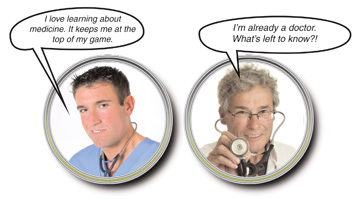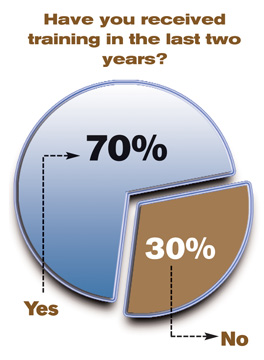

For argument’s sake, let’s say that you need a doctor and there are two for you to choose from. But the only thing that you get to know about them to assist you in making a choice is;
Doctor A:
20 years experience in his field.
Attends every seminar and conference that relates to his field, reads everything available on new methods and technology.
Doctor B:
20 years experience in his field.
States that he’s been practicing medicine for 20 years and pretty much knows everything already. He attends no seminars or conferences because they’re a waste of time, and he never reads anything on new methods. He says he’s had a lot of experience and that helps him muddle through any new situation that may arise.
Who would you choose?
< Jeopardy Theme >
Aside from maybe the guy’s wife, I can’t imagine Doctor B getting even one vote. Could Doctor A be a quack? Of course, but I think that because of the evidence of training and an open mind, we’d all select him.
Now let’s take it a bit further. Instead of a doctor, let’s make the profession blue-collar like us. How about an electrician. If you needed someone to wire a new addition on your house, would you hire the Mr. Know-It-All described in example B or would you want the person working on your house to be like Doctor A — eager to improve and open to new methods.
This is an easy choice as well.
And given the fact that the human body stays basically the same while the automobile changes every year, I’d say that we in the collision repair industry have even more of a reason than doctors do to attend training classes.
Although I do believe that the Know-It-Alls are in the minority, there are still too many of them in our industry. Technicians, managers and owners who “grew up” in the business who learn about new designs and materials only when they encounter them during a repair figure that’s good enough.
It’s not.
Before 1980, aside from equipment-specific training, there was no formal training designed for the collision repair shop employee. That’s only 25 years ago, and the automobile is more than 100 years old.
Even today there are no state or federal repair laws that I’m aware of that require training for vehicle re-construction. We receive testing and certification from the Society of Automotive Service Excellence (ASE), but no organization or body mandates that major collision repairs be performed only by an ASE Certified technician. Just who performs the repairs on a collision-damaged vehicle is left up to the shop owner or manager.
When you consider that families drive at high speeds in cars that we repair, it appears that we’re playing Russian Roulette with a panel cutter.
Before I go any farther, let me address those of you who are ready to argue that you know a technician who has 20 ASE certifications and 50 I-CAR class credits but can’t change the bulb in a droplight. And you also know a guy with no training whatsoever who can fix anything and never has a comeback.
Yes, I know a few of these individuals myself, but let’s keep things honest and real here. Those techs aren’t the majority or the norm — and all of you know it. If you really believe your own argument, you would have selected Doctor B (and I’m willing to bet you didn’t). In too many cases, that argument is just an excuse to stay comfortable within your present knowledge and not have to exert yourself any further.
I know an accountant who has three degrees in accounting, and he probably couldn’t accurately count the raisins inside of a box of Raisin Bran — but does that mean that no one should attend any accounting courses? Of course not. The fact is, there are unqualified certified individuals in every profession and in every trade. Collision repair doesn’t have a monopoly on certified incompetent “professionals.”
However we still need some sort of a yardstick similar to the ones that other professions have so that those on the outside of our profession have a means to tell the good guys from the bad guys. Still, nothing is absolute; one can still pick the wrong person or company. That’s just the way it is.
In collision repair, love ’em or hate ’em, our yardsticks are ASE and I-CAR. For the most part, they’re all we have to provide us information direct from the vehicle manufacturers and to test our knowledge of automobile repair. By the way, Mr. Know-It-All doesn’t like these organizations because he feels that they’re unnecessary. He already knows it all and will be the first to tell others about the raisin-counting accountant.
To be fair, I understand why some may look down on I-CAR training. In many cases, they’ve attended an I-CAR class at some time in their careers (or were forced to attend) and because of the course content or the instructor or both, they didn’t learn anything.
The classes are usually conducted during the students’ personal time and if they don’t hear or see something worthwhile, they’ll hate every minute of it and may not attend another. Also, very experienced people may have sat through a class that should have only been presented to entry-level technicians — but wasn’t titled as such.
Four hours is a long time for experienced collision people to sit and hear things they learned their first six months in the business. I know because that’s happened to me and it’s a valid complaint. But this is still not a reason to be an outspoken critic of training and certainly not a reason to forego all future training opportunities.
It is a reason, however, to be more particular in selecting the next course and/or the next instructor. But how does one do that?
From experience, I can tell you that this is a challenge. All I-CAR instructors are not created equal, and all I-CAR courses don’t apply to every technician.
Unless you get a referral from someone, selecting the right I-CAR course and instructor can be a difficult task. In addition, you may have no desire to attend if your first experience with I-CAR was a negative one.
You can find assistance in course selection at www.i-car.com. On the I-CAR Web site under “schedules,” they list the names of the regional managers. Contact the proper person in your area and relate your specific concerns. I’m fairly confident that they will do their best to assist you. I know that in our area, Regional Manager David Coffey was most helpful.
Some common reasons I’ve heard not to attend an I-CAR class are:
- Too far to travel.
- The classes are at night or on my other personal time and I don’t get paid to attend.
- I get home too late.
- I didn’t learn anything at the last class I went to.
- The instructor put me to sleep.
The only valid objections are the last two, and with some effort, they can be addressed and corrected. The first three reasons aren’t valid if you went into the collision repair field of your own free will. They aren’t valid because one or all three of them could be a part of what it takes to stay abreast of changes in the profession of your choice; it goes with the territory.
If you don’t want to be bothered with driving to training classes after hours, then pick another profession where continuing education isn’t necessary. In my opinion, by shunning available training, you’re not fulfilling your obligation to the shop owner (or the technicians, if you’re an owner) or to the vehicle owners.
Our locations are spread across two states, and we, too, have to deal with all these things and excuses — but on a much larger scale. Selecting the correct class and hoping to get a good instructor are difficult enough. But trying to get class locations close to everyone’s residence in addition is a logistical nightmare.
So, instead, we recently addressed this by hiring our own trainer who’s an I-CAR instructor. In addition to I-CAR classes and other duties, he’s responsible for scheduling ASE review and testing, making sure our technicians hold proper Mobile Air Conditioning Society (MACS) certification and scheduling and administering SP/2 testing.
Having a staff instructor that we selected ensures that the class content for each job description will be relevant and that the information will be presented in an informative and challenging manner. But it still takes a technician with the correct attitude to make the system work and be worthwhile. Unfortunately, Mr. Know-It-All lives here too, and we must institute measures for that.
From my experience in attending I-CAR classes, it’s my opinion that if you’re an experienced tech, manager or owner, you’ll already know about 80 percent of the material that you’ll hear in an I-CAR class. I estimate that, on average, 20 percent of the instructed material will be new to you or will be things you already knew, but presented in a different light that will benefit you.
But not attending a class because you already know most of the content isn’t a good idea. You don’t know what you don’t know.
You may have to say that out loud to yourself.
You don’t know what you don’t know. Case in point: Right around the time of the introduction of MIG welders (OK, I’m old), we had a Corvette in for repair that had backed over a parking pole. Along with the cosmetic damage, the rear cross member was severely damaged and had to be replaced. We drove the ’Vette into a stall, did the necessary body repairs, cut out the damaged cross member, installed the new one and welded it in with our new MIG welder.
Unfortunately, neither the technician nor management had any formal training in MIG welding (just the instruction given by the jobber) so they didn’t disconnect the battery in the Corvette before welding. The result was the car wouldn’t start, and it took three days and $800 to replace the computer inside of the right front kick panel — which burned out from the electrical charge conducted through the car by the MIG welder. It was an experienced tech who did the repairs — unfortunately, an experienced Know-It-All tech.
In the most basic MIG welding classes today, one of the first things they tell you is why you must disconnect the ground cable of the battery before MIG welding. But Mr. Know-It-All didn’t need instruction because he’d been repairing cars for 15 years. To make matters worse, the owner of the shop — yours truly — didn’t enforce training because he, too, was a Mr. Know-It-All.
Was.
Here it is, 2005, and still too many technicians who we hire say they’ve never attended an I-CAR class. They are, however, in the minority, and that’s a positive change from years ago.
If you’re a shop owner, it’s to your immediate benefit to provide training opportunities for your technicians because a quality class with a quality instructor should provide immediate benefits your company.
A class on corrosion protection will immediately improve the quality of your finished product. A class on hazardous materials/personnel safety greatly increases your odds of surviving an inspection by the EPA or OSHA. A fault code and diagnostics class along with a scanner could mean not having to send a vehicle out to repair a “check engine” light. And because the detailer is the last person who has his hands on the finished vehicle before the client sees it, how much better could your product be if your detailer attended a detailing class?
As for the cost of the training, there are several ways shops handle it:
1. The technician pays the full cost and is fully reimbursed after X amount of months with the company.
2. The company and technician each pay half the cost.
3. The company and technician each pay half and the technician gets reimbursed after X amount of months with the company.
4. The company pays the entire cost of training.
Especially considering the shortage of quality technicians, any one of the above arrangements is better than doing nothing.
As for any technicians also reading this article, I have a real good suggestion for you (and it applies to every trade): Never pass up free or partially-paid training. Never. At the very least, it becomes part of your résumé and the knowledge goes with you wherever you may go.
If you make your living doing collision repair and your employer is willing to go for at least part of the freight to give you something that others have to pay hundreds even thousands of dollars to get, you’d have to be a fool not to take it.
Even if you get home late.
Writer Richard V. Brigidi handles site development for CollisionMax, a collision repair company with multiple locations specializing in insurance claims on late-model vehicles.













